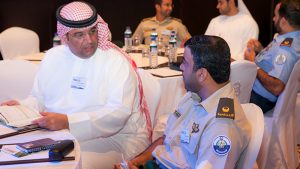 The benefits of developing satellite communications for national security and commercial purposes were highlighted at the 4th Annual Milsatcom Middle East conference held in Abu Dhabi. Industry leaders from across the globe gathered to analyse the challenges that the industry faces in terms of capability constraints, budget revisions and a trained workforce.
The benefits of developing satellite communications for national security and commercial purposes were highlighted at the 4th Annual Milsatcom Middle East conference held in Abu Dhabi. Industry leaders from across the globe gathered to analyse the challenges that the industry faces in terms of capability constraints, budget revisions and a trained workforce.
The Director General of the UAE Space Agency HE Mohammed Al Ahbabi explained how developing solid space foundations and applications has proven its positive impact on improving the quality of life worldwide and on global economic growth, with benefits that extend beyond the borders of the space faring nations.
Al Ahbabi emphasised how military operations today depend on space, noting that approximately 60 nations own and operate at least one satellite. Space capabilities are crucial for a range of military activities including responding to humanitarian relief after natural disasters in addition to times of war.
Yahsat CEO, Masood M. Sharif Mahmood commented: “Milsatcom offers a unique platform to examine some of the key issues and technological developments in the satellite communications market. As a market leader, to be able to deliver effective milsatcom solutions to our end clients, it is important for us to study these trends and understand the key dynamics and challenges to align our innovative solutions with industry needs.
At Yahsat, we aim to drive satellite innovation and the next generation of defence communications. Through our government services part of the operations, YahService, we have been successful at providing end-to-end managed services to government and commercial clients.”
The market size for the Global Milsatcom Applications market is estimated to be $3.05 billion in 2013 and will reach $3.82 billion by 2022, growing by a CAGR of 2.5 percent. Major growth will be seen in the fixed satcom segment about 33 percent during the coming decade.
The Middle East and Asia Pacific satellite communications markets are forecast to grow significantly in the next 10 years as force modernization trends are in full flow in these markets. Industry consolidation among suppliers and collaborative efforts from defence forces will result in “pooling and sharing” of resources, especially in the European market.
Dr Al Ahbabi described how the UAE leadership has made a firm commitment to keeping the country at the forefront of space development by announcing the establishment of the UAE Space Agency and the UAE’s own mission to explore Mars.
The newly set-up UAE Space Agency will be responsible for developing the space sector as well as regulating the industry, creating job opportunities for Emiratis within the sector and raising awareness on how space is playing a major role in the country’s sustainable economic development and growth
The aerospace and space industries in the UAE are continuing to be key drivers to the national economy. Today, the UAE operates more than 7 satellites for both commercial and milsatcom use.
UAE investment in space technology is continuing to grow. The UAE seeks to develop a long-term strategic plan for a solid and sustainable foundation for advanced space innovation and exploration. All of which is expected to aid the growth of science and knowledge based economy. Compared to the USD$300 billion international space industry, the UAE’s investment in space technology is already substantial exceeding AED 20 billion (USD 5.44 billion).
Staff Brigadier, Mubarak Saed Ghafan Al Jabbri, Head of Communications and IT Department, GHQ Armed Forces highlighted the importance of innovation and the role of advanced technologies. He explained how the UAE Armed Forces have been pioneers in developing this sector and have cooperated with international specialists in improving milsatcom capabilities.
“The growing and changing operational requirements of military communication systems resulting from the complications of modern battlefield and net-centric warfare, all emphasise the importance of providing satellite communication solutions for field commanders in order to implement their plans and achieve informational superiority over enemies,” commented Al Jabbri.












Add Comment